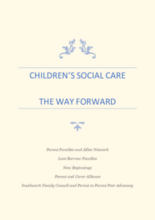This report is based on consultations with parents and allies in England carried out by Parent Families and Allies Network; Love Barrow Families; New Beginnings; Parent and Carer Alliance; and Southwark Family Council and Parent to Parent Peer Advocacy. It sets out ideas on making the care system more supportive, humane and inclusive, and ensuring families’ needs are met early, with advocacy as a core feature. It also argues for immediate changes, led by parents and children with lived experience of social care. The report is based on the experiences of some of these parents, with input from allies who work in children’s social care or are social work academics.
The main issues the report identifies are:
- Social work with children and families has become engulfed in child protection processes and care proceedings, with associated heavy bureaucratic demands. It focuses almost entirely on risk, at the cost of meeting needs. This is embedded in Working Together to Safeguard Children. Blame permeates the system for families, but also for social workers, when things go wrong.
- For a variety of reasons, there is constant change and a lack of stability in the system. As a result, families do not experience continuity of services. Further, there is a focus on assessments and meetings, but not enough on offering and providing support.
- Legal representation for parents and children does not function effectively in many family court cases. Further, the lack of investment in therapeutic services for parents involved in care proceedings can effectively set them up to fail.
- Current responses can leave mothers who have experienced domestic abuse doubly oppressed, by being subject to domestic violence while being threatened with having their children removed. There is a need to better understand and accept how the state and its agencies can reinforce oppression.
- Many families with a disabled child are forced through safeguarding assessments when there is no indication of neglect or abuse, and don’t receive the help they need.
- The prioritisation of adoption means too many children lose all family ties.
- The system lacks champions to develop new ways of inclusive partnership working with families.

